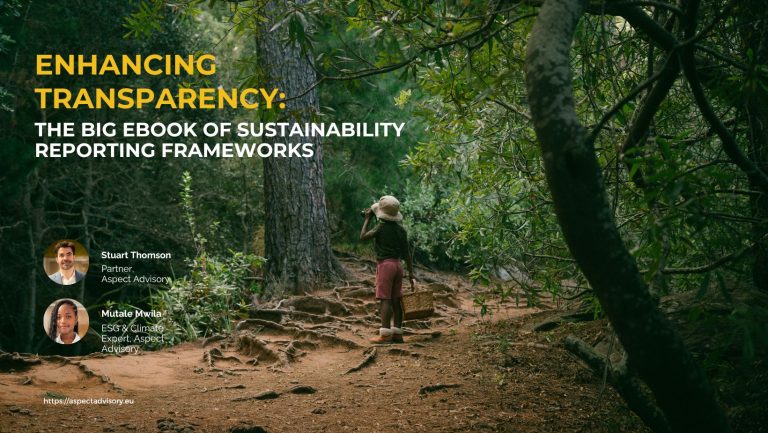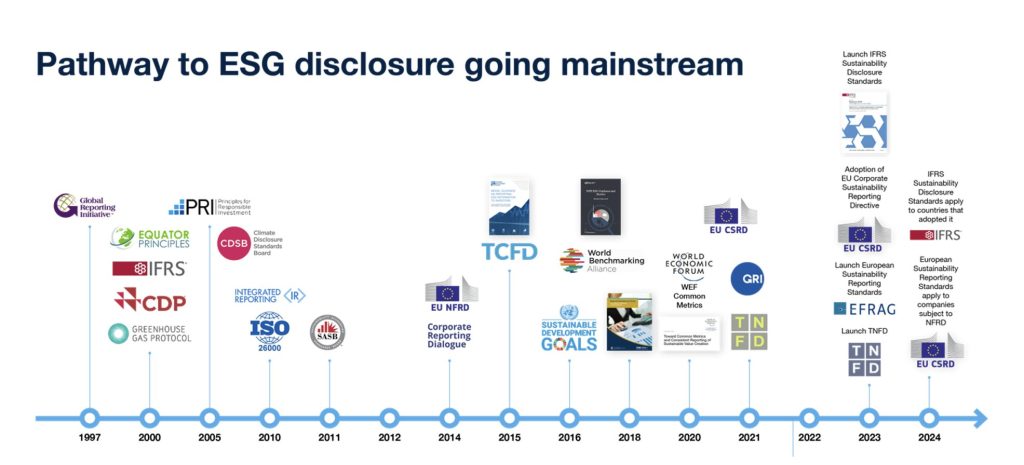
1. Introduction
In today’s business environment, sustainability reporting has become a critical component for organisations aiming to demonstrate their commitment to environmental, social, and governance (ESG) principles. A diverse range of stakeholders, including investors, customers, regulators, and non-governmental organisations (NGOs), increasingly demand transparency and accountability. Investors seek detailed ESG information to make informed decisions and mitigate risks. Regulators require compliance with environmental and social regulations, while NGOs advocate for sustainable and ethical business practices. By effectively communicating their sustainability efforts and meeting the diverse needs of these stakeholders, companies can build trust, enhance their reputation, and achieve long-term success.
2. The Importance of Sustainability Reporting
To meet these diverse stakeholder expectations and showcase their commitment to ESG principles, companies must engage in comprehensive sustainability reporting. Sustainability reporting helps organisations track and disclose their performance on various ESG metrics, enabling them to identify areas for improvement, manage risks, and enhance their reputation among stakeholders. Effective reporting can attract investors, improve regulatory compliance, and foster a culture of sustainability within the organisation, positioning businesses for long-term success.
3. The Evolution and Challenge of Reporting Frameworks
As the importance of sustainability reporting has grown, so too has the number and complexity of reporting frameworks. These frameworks have evolved significantly over time, initially designed to meet basic environmental reporting needs but now encompassing a broad range of ESG topics. This evolution continues as new frameworks are developed and existing ones are updated to reflect the latest best practices and regulatory requirements. The increasing demands from stakeholders for more detailed and transparent reporting drive this ongoing development.

There are now more than 30 different sustainability reporting frameworks available, each with its own set of guidelines and metrics. This variety can be overwhelming for companies trying to determine which frameworks to adopt. Stock exchanges and regulators have played a significant role in this evolution by developing sustainability and climate disclosure regulations. For instance, according to the UN Sustainability Stock Exchanges database, mandatory disclosure rules are now enforced in 27 markets. This rapid development makes it challenging for organisations to stay up-to-date with evolving requirements.
4. The Big eBook of Sustainability Reporting Frameworks
To help companies navigate the complexity of sustainability reporting, EcoAct created the Big eBook of Sustainability Reporting Frameworks. This comprehensive guide categorises the most widely used sustainability reporting frameworks into three main groups:
a. Energy & Emissions Frameworks
This category encompasses the majority of the mandatory frameworks featured in the Big eBook. These frameworks ensure that large companies provide thorough disclosures of their emissions and energy usage. The category incorporates relevant legislation and permits, alongside globally recognised methodologies for calculating emissions such as the Gas (GHG) Protocol and ISO 14064. Furthermore, this section includes voluntary certifications for companies that are proactive in addressing climate change and emissions reduction.
b. Sustainability Frameworks
This section features primarily voluntary frameworks, though there is a growing expectation for businesses to engage with at least one of them. These frameworks not only include emissions and energy metrics but also address a wide array of critical environmental, social, and governance (ESG) issues. These issues are fundamental to achieving overall sustainability. Key frameworks in this category include the Sustainable Development Goals (SDGs), the Global Reporting Initiative (GRI), and the Corporate Sustainability Reporting Directive (CSRD).
c. Frameworks for Financial Institutions
Financial institutions are pivotal in driving the transition to a net-zero economy. This newly added section of the eBook details frameworks tailored specifically for the financial sector. Although many of these frameworks are currently voluntary, there is increasing pressure for financial institutions to improve their climate risk disclosures. Important frameworks in this category include the Partnership for Carbon Accounting Financials (PCAF) and relevant legislation such as the Sustainable Finance Disclosure Regulation (SFDR).
5. Detailed Descriptions and Practical Overviews
The Big eBook of Sustainability Reporting Frameworks goes beyond merely listing these frameworks; it provides detailed descriptions that help organisations understand each framework’s scope, compliance requirements, and reporting obligations. The eBook outlines who must comply with each framework, what specific data needs to be reported, and whether the framework is mandatory or voluntary. This clarity is crucial for organisations trying to navigate the often confusing landscape of sustainability reporting.
Moreover, the eBook highlights the purpose and benefits of each framework, offering practical overviews that are relevant to different sectors. Whether a company is involved in high-emission industries, real estate, or financial services, the eBook provides sector-specific guidance that helps organisations align with the most relevant frameworks for their operations.
While the Big eBook covers a broad range of frameworks, it does so selectively, focusing on the most essential and widely adopted ones. This approach ensures that users have access to the most impactful and relevant information without being overwhelmed by every possible option. The eBook is designed to be a non-exhaustive guide that brings together all key information into one place, making it an invaluable resource for businesses looking to enhance their sustainability reporting practices.
6. An Invaluable Starting Point
It is important to note, however, that while the Big eBook offers an excellent starting point, it does not delve into the precise details of each framework. Once organisations have identified the frameworks that are most relevant to their operations, they will need to consult the specific guidelines and requirements of those frameworks to ensure full compliance. Despite this limitation, the eBook remains a critical tool in helping organisations identify the right frameworks to adopt, ultimately serving as a crucial step towards achieving greater transparency and accountability in their sustainability efforts.
The journey towards effective sustainability reporting is essential for any organisation committed to transparency, accountability, and long-term success. Understanding and navigating the various reporting frameworks is crucial, but it can be challenging given the diversity and complexity of available options. The Big eBook of Sustainability Reporting Frameworks by EcoAct serves as a guide, offering clear and concise descriptions of the most impactful frameworks. While it provides an excellent starting point, organisations will need to delve into the specific details of each framework to ensure full compliance and effectiveness.
At Aspect Advisory, we are here to support you in all your sustainability reporting needs. Our team of experts can help you navigate the complexities of different reporting frameworks, ensuring you select and implement the most relevant ones for your organisation. We provide tailored advice and practical solutions to enhance your sustainability reporting practices, driving greater transparency, accountability, and ultimately, success in your sustainability efforts. Whether you are just beginning your sustainability journey or looking to refine your existing reporting processes, Aspect Advisory is your trusted partner in achieving your ESG goals.
Contact us

Stuart Thomson
Partner,
Aspect Advisory
![]()
